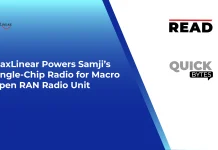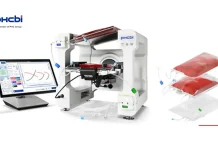GlobalFoundries has formally announced a strategic collaboration with BAE Systems to develop advanced radiation-hardened semiconductor chips tailored for space applications. The chips will be built on GlobalFoundries’ high-volume 12LP FinFET process at its secure Malta, New York facility.
BAE Systems has introduced its RH12™ Storefront, a turnkey design and IP solution that applies its proprietary radiation-hardening techniques to highly scalable 12-nanometer FinFET technology. The result: space-grade integrated circuits. They combine RF capabilities, low-power memory, and logic. These circuits are optimized for tough uses, like satellite avionics and telecommunications.
What This Partnership Brings to the Table
Secure, High-Performance Manufacturing
GlobalFoundries’ Malta fab meets DMEA (Defense Microelectronics Activity) standards for secure manufacturing. This enables the production of sensitive aerospace and defense chips. It also complies with strict export controls like ITAR and EAR. As a result, the chips are high-performance and made in a trusted, secure environment.
Radiation-Hardening via RH12 Storefront
BAE’s RH12 Storefront provides clients with a full-service solution for developing radiation-hardened integrated circuits (ICs) using FinFET technology. The strategy covers not just design libraries, but also the process architecture – reducing the time-to-market for custom space-grade chips. According to BAE, this is the first turnkey offering for 12 nm radiation-hardened ICs.
Performance, Efficiency, and Reliability
The 12LP FinFET platform offers impressive performance, power efficiency, and connectivity. These chips are designed to thrive in challenging environments. They can endure high radiation, low temperatures, and vacuum conditions. This reliability is crucial for avionics, satellite systems, and telecommunications. We believe this technology will greatly benefit these industries.
Implications for the Semiconductors-for-Space Industry
This partnership could have wide-ranging effects across the semiconductors-for-space industry:
Broadening Access to Space-Grade Chips: By combining BAE Systems’ design IP and GlobalFoundries’ high-volume manufacturing, the RH12 Storefront lowers barriers for customers who need radiation-hardened chips without building everything from scratch. This could democratize access to space-grade semiconductors.
Bridging Commercial and Defense Markets: Traditionally, space-grade semiconductors have leaned heavily on specialized, low-volume processes. This collaboration brings commercial FinFET technology into space applications, offering a more cost-effective and scalable route – especially for satellite makers and new-space companies.
Acceleration of On-Orbit Compute: Satellite systems are getting more complex. They manage AI, edge compute, communications, and more. This raises the need for efficient, high-performance chips that can resist radiation. This new offering meets that demand, allowing for more capable spacecraft.
Also Read: Keysight Introduces i7090 Massively Parallel and Scalable Board Test System
Securing U.S. Supply Chains: Accredited U.S. facilities produce chips vital for national security and defense. This shows the important role of domestic semiconductor manufacturing in sensitive aerospace missions.
Driving Innovation in Space Electronics: We provide a complete solution for startups, integrators, and system architects. This helps them evaluate new designs for space electronics. This sparks new ideas in small satellites. It also boosts edge computing in space and improves next-gen telecom payloads.
Business Impacts & Strategic Considerations
Satellite Manufacturers & Prime Contractors: High-performance, space-hardened chips will greatly benefit these groups. They offer scalability and cost savings compared to traditional space-grade options.
New-Space Startups: Entrepreneurs building small satellites or constellations can use this solution. It increases computing power and adds smarter payloads. Plus, it does this without the high costs of traditional radiation-hardened chip design.
Defense & Government: This partnership provides defense agencies and government contractors with a reliable source for essential integrated circuits (ICs). These ICs are made under strict conditions. This guarantees good performance and reliable supply chains.
Foundry & Electronics Suppliers: Some foundries may develop their own space-grade processes. Others might partner with design firms. This could boost competition and spark innovation in the space semiconductor sector.
GlobalFoundries: This deal boosts GF’s position in reliable markets, such as defense and space. It gives them a unique edge over competitors in consumer and automotive chips.
Challenges & Risks
While the collaboration holds promise, it also presents several challenges:
Qualification & Certification: Space-grade chips must undergo strict tests. They need to pass checks for radiation, thermal, and vacuum conditions before use. Making sure the 12LP FinFET chips meet these standards might take a lot of time and testing.
Customer Adoption Risk: Some traditional aerospace suppliers may be cautious about using chips made with commercial radiation-hardened processes. They prefer established space-specific nodes.
Cost vs. Volume: FinFET technology scales well. However, clients should weigh the cost benefits against lower-volume specialized processes. This depends on how critical the mission is and the production scale.
Supply Chain Constraints: Demand for space-grade chips is rising, so GF needs to manage production capacity wisely. This is especially important in a trusted foundry environment.
Conclusion
GlobalFoundries’ collaboration with BAE Systems to deliver radiation-hardened 12 nm FinFET semiconductors marks a pivotal moment for the semiconductors-for-space ecosystem. By bringing commercial technology into space-hardened applications — while ensuring secure, accredited manufacturing — they could unlock new capabilities for both defense and commercial space sectors.
Satellite operators, aerospace contractors, and new-space companies are starting to use these chips. This could change how on-orbit computing is designed. It may become more capable, reliable, and cost-effective. The GF-BAE storefront model may set a standard for future space-grade semiconductors. It can boost innovation and improve the home supply chain for key space electronics.






